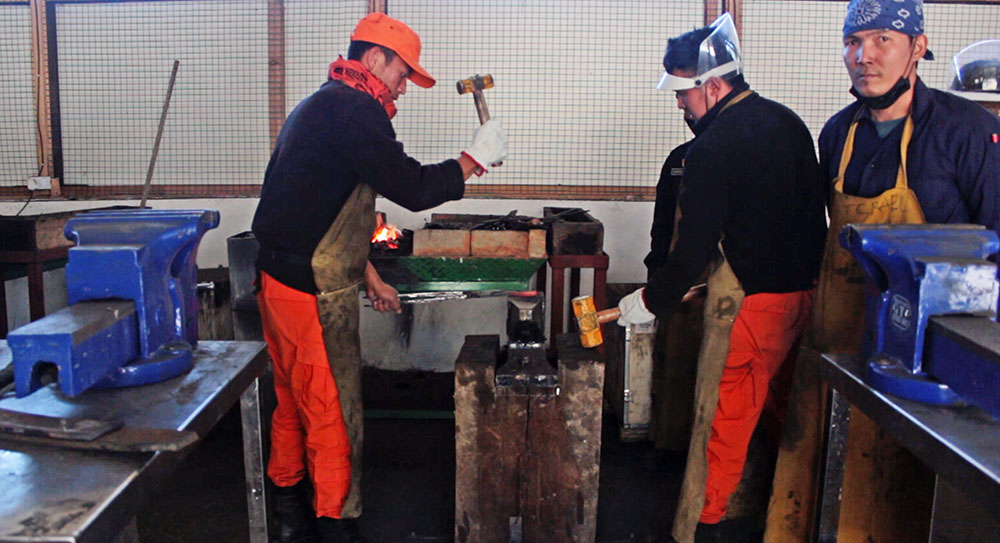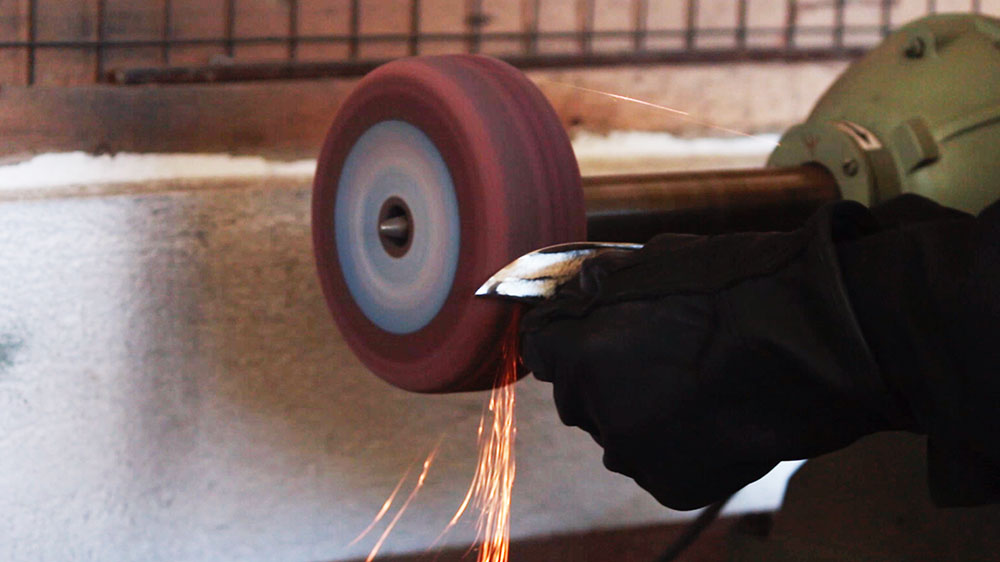Jigme Wangchuk
It begins with beating the billets, a long and arduous process in refining metal which will be followed by milling, turning, grinding, filing, broaching, and drilling. Stock removal, a process that involves using saws, belt sanders, and abrasives to strip material away from a steel workpiece, is the favoured way to create blade shapes faster.
A few metres away, amid the roaring blare of cutting tools and machines, a group of men are busy carving chotse, intricate design details, on a traditional Bhutanese domestic altar—choeshum. This is their final project that will show how proficient and skilled they are in woodworking.
When the nation was going through a difficult time, thousands of youth joined the de-suung programme to volunteer for critical services such as border patrolling, service delivery, and crowd control, among others. His Majesty the King commanded that for the exceptional services that the de-suups rendered the State should reciprocate by providing opportunities for the youth to enhance their skills and capabilities so that they can participate meaningfully in the process of nation building.



More than 1,000 de-suups are undergoing various high-quality skilling programmes
More than 1,000 de-suups are undergoing various high-quality skilling programmes in about 45 centres across the country. The idea is to foster skills development among young Bhutanese so that they become not only employable but also help address the unemployment situation in the country by becoming employers themselves.
At a time when skills mismatch and shortage of human resources are major issues, particularly in the building and construction sector, a large number of potential workforce with required skills is expected to fill the gap. It is also indicative of a change in the Bhutanese mindset towards blue-collar jobs, which are becoming increasingly accepted and encouraged.
Looking from the perspective of the unemployment situation in the country, what seems to come out starkly is that quality education and skills development have not received the priority they deserve. There was a generation of Bhutanese who had all the opportunities to serve the nation in various capacities. Today, with a special focus on STEM education, the new generation of Bhutan are being prepared for an exciting future. The generation of Bhutanese in between lack the skills to stand them in good stead professionally.
Mani Raj Rai, 27, is undergoing carpentry and woodworking training at Taba, Thimphu. He has just a few days left to complete the training. The excitement is palpable.
“I am confident and pretty clear about what I am going to do after this training,” said the former tour guide. “I can make anything out of a piece of wood, because we are trained by some of the best in the world to deliver quality products.”
Mani Raj is also looking to join other skills development training. “The more skills we have, the more independent we are. If I can’t start my own woodwork business immediately, I am thinking of availing sword and blade craft training.”
Wangchuk Dorji, 38, was working with Ugyen Trading before he decided to join the de-suung programme. Today he is one of the many young de-suups who are training to become top-rate automobile repairman.
“It was challenging in the beginning because none of us had any prior experience. But now I can repair all kinds of vehicles.”
Recently, Wangchuk Dorji met with his friends from one of the technical training institutes. They were left amazed how much he had learnt in just a few weeks. At Taba, the trainees have stripped an old Hilux to a bare metal frame and are fixing the parts one at a time. Radiator properly fixed, they are now putting another leaf springs on the rear end of the vehicle.
“With vehicle numbers rising in the country, there is a huge business opportunity. More importantly, we can help build a strong, skilled manpower in the automobile repair sector,” said Wangchuk Dorji.
What is beautiful about the de-suung skilling programme is that it allows and encourages life-long learning in diverse fields from hairdressing and makeup to horticulture to digital marketing to photography to bicycle repair and much more. A trainee can join any other skills development training after completing a particular training course.
Jigdrel Dorji, 24, is undergoing advanced culinary arts (multi-cuisine) training. While waiting for hot brioche bread to come out of the oven, he contemplates his plating design.
“This kind of gets me nervous but I am getting better at it,” he says. For a person who could barely make something palatable out of instant noodles before, this is a phenomenal achievement. And he is very proud of himself.
“I must thank His Majesty the King for giving us this opportunity. The few months’ training has made me a confident and focused individual with a clear sense of direction. I can’t imagine what I would have been doing had it not been for such an important milestone in my life,” said Jigdrel Dorji, who has plans to open a top-end restaurant in Thimphu.
At Dechencholing, lunch break is over and they have had enough rest time. Integrated fitness training is about to begin. Joining the young de-suups are a few soldiers from the Royal Body Guard.
“We are just beginning,” said Tandin Zam, who now looks at fitness from a more holistic angle. She wants to be a professionally trained fitness and gym instructor. Her friend, Tshewang Norbu, 24, has a friend in Gelephu who has opened a gym and is looking for a professional trainer. He has already decided where to go and what to do.


